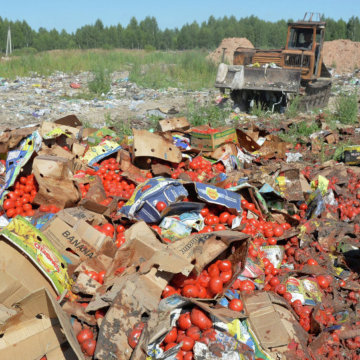- About
- Topics
- Picks
- Audio
- Story
- In-Depth
- Opinion
- News
- Donate
- Signup for our newsletterOur Editors' Best Picks.Send
Read, Debate: Engage.
| located: | Russia |
|---|---|
| editor: | Igor Serebryany |
Russian Ministry of Agriculture pushes forward amendments to a law that would ban food import – even for personal consumption. This is the second of such an attempt in two weeks. In late April, National Meat Association and agricultural watchdog Rosselhoznadzor asked deputy prime minister Alexei Gordeev to ban the import of meat and dairy products, citing safety concerns.
Food import has been a political issue in Russia since 2014, when the Kremlin banned the imports of food from Europe, the United States, Canada, and other Western countries. However, Russian travellers retained a possibility to bring back home up to five kilograms of food for personal consumption. Last week, the head of the Miratorg food chain Victor Linnik blamed fellow citizens for "unpatriotic stances" and urged them to buy only Russian foods. Social media platforms have erupted with rage, calling to boycott the chain stores.
This is not only about a perverted way of countering Western sanctions. Attempts to seal the Russian food market hermetically bears certain economic sense, former Minister of Agriculture Leonid Kholod believes. Though no more than five percent of Russian citizens travel to Europe in recent years, the foods they import in their hand luggage makes up a noticeable amount of Russia's "haut cuisine" market, he notes. "Only a tiny fraction of Russian consumers can afford all those foods which, for some reason, have collectively been named 'jamon' in Russia. They are expensive and rare. So the food plants which produce 'analogs' of jamon, parmesan and other European delights, have been highly sensitive that someone ruins their monopoly at that niche market," Kholod says.
Food safety concerns cited by the agriculture lobbyists are fake, he adds. "Show me a tourist who would bring a chunk of raw meat in his luggage. The foods they carry with them are thermally processed and vacuum sealed. No bacteria would survive. Meanwhile, the same bacteria could be easily taken into Russia on the car tires if the car has driven close to the infected fields or farms", the expert explains.
The other reason behind Russian's agricultural officials move to clamp down on the "five-kilo" limit is a huge gap in quality of European foods and their local "cousins". "While original European foods could be purchased in the local supermarkets, a consumer can always compare the taste of cheese made in Italy with the taste of cheese made in Russia and having the same name. So Russian meat and cheese makers are unhappy that consumers have such a choice. If there will be no competing foreign foods, they will be able to sell any 'generic' produce disguised as an original product. And no one could be able to check if a pig's leg called jamon is actually Spanish ham", Kholod says.
An expert in the meat industry, Boris Ryabinkin agrees that Russian food producers have been trying to utilise a comfortable political situation in order to win state protection measures. "Our meat and dairy producers can't compete fairly with Western competitors. So I strongly suspect that safety concerns are nothing but a pretense", he says.
